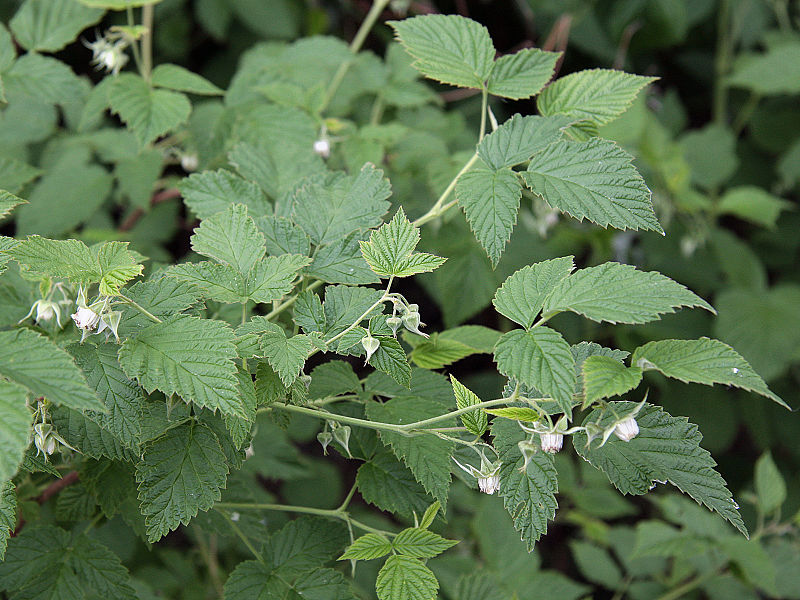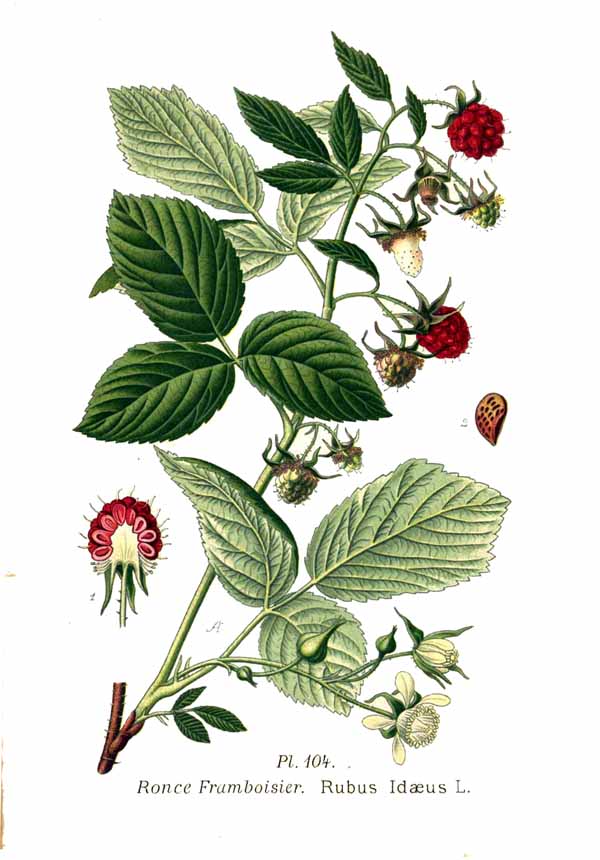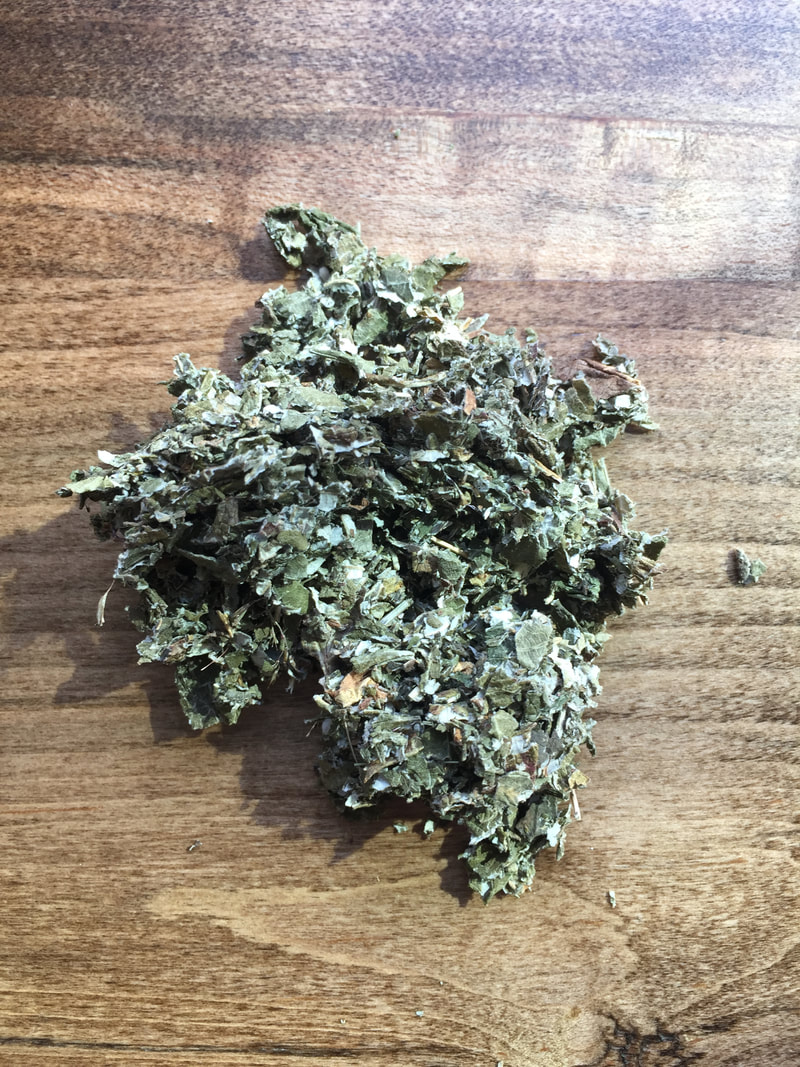|
Raspberry leaf (Rubus idaeus) is a beautiful, delicious, nutritive and practical herb, and a very versatile plant that appeals to nearly everyone in one way or another. Most of us are familiar with raspberry as a food — who doesn’t love fresh summer-ripe raspberries? But the part of the plant that I’ll be discussing in this article is the leaf. I love the foliage of this plant: the leaves are run through with veins, and are dark green on the top, and a lovely silvery-white on the back. If you ever run into a brambly-type of plant growing in or near a forest you might be unsure if what you are encountering is a blackberry or a raspberry as they look quite similar. But a quick way to tell the difference is to turn the leaf over: if it has that beautiful silver-white color to it, you know you have found raspberry. This delightful fruiting shrub is native to both to Asia and North America, and is a member of one of my favorite plant families, the Rosa (a.k.a. Rosaceae) family. While everyone is aware that raspberry fruits are edible and nutritive, most people do not know that the leaves themselves are a very nutritive agent. In fact, they are high in Vitamins C, E, A and B, and hold a range of minerals such as magnesium, potassium, calcium, and phosphorus. They also contain essential trace minerals such as zinc, iron, chromium and manganese. These vitamins and minerals are imparted to us when we make a tea out of the dried leaves. Beyond being a gentle, nourishing herb raspberry has been used for centuries to support respiratory, digestive and reproductive health. In Ayurvedic medicine raspberry leaves are considered to be a cooling herb that is good for reducing heat and inflammation in the body, especially throughout the digestive tract. As an astringent herb it helps to tighten up the skin around wounds and promote healing. It is traditionally used for diarrhea; nowadays it is also used to strengthen the lining of the intestinal tract where there is permeability or “leaky gut.” Raspberry leaf can help protect the gut from irritation and inflammation.
Raspberry leaf is most famously known as a lovely and supportive herb for women’s reproductive health, especially during the childbearing years. As a tea raspberry can help ease menstrual cramping (perhaps due in part to its high content of magnesium). In addition, the leaves contain an alkaloid called fragrine which helps strengthen and tone the uterus and the pelvic area. This special constituent can promote fertility, prevent miscarriage, and prepare a pregnant woman for birth. In my own recent pregnancy I drank a lot of raspberry leaf tea. However, I waited until the second trimester to do so because if taken earlier it may cause a sensation of cramping. (I typically recommend only food grade herbs during pregnancy, but especially in the first trimester.) I increased my intake of raspberry leaf tea as I neared my due date. I felt that it was gentle, supportive and full of so many good vitamins and minerals for both me and the baby. I also brought a huge container of the tea with me to the birth! Many people claim that it can promote a shorter and easier labor. I can’t say if it truly does or not. My own labor was relatively quick and straightforward for a first-time mom… but it definitely was not easy! I also drank raspberry leaf tea right after the birth and for a while afterwards to help the uterus regain its normal size and tone. Again, I found the mineral content of the tea to be refreshing and helpful after such a physically intense process. Hands down, raspberry leaf is my favorite herb for fertility, pregnancy, and post-natal health. But it’s not just for women! Men can also benefit from raspberry leaf as it supports prostate health and has a toning effect for the whole male reproductive system. Raspberry tea is also wonderful, safe and gentle enough for kids (perhaps sweetened with a bit of honey.) I also enjoy it as a simple beverage tea — it makes a wonderful alternative to conventional iced tea, having a similar flavor, but without the caffeine. HOW TO USE: ➤ Steep 1-2 teaspoons of dried leaf per cup of hot water for 10 minutes. ➤ To make a more nutritive infusion with a high content of minerals, steep 4 tablespoons dried herb in a quart of hot water for 6 to 8 hours. ➤ Raspberry leaf makes a great iced tea in the summer. You can do a cold-brew steep (or sun tea) of raspberry leaf by placing 4 tablespoons of the dried leaf in a quart of cold water for 3 to 5 hours. Place in a sunny windowsill if possible. ➤ Raspberry leaf mixes well with rose petals, red clover, mint, and chamomile NOTES: In pregnancy wait until the 2nd trimester to begin drinking red raspberry leaf tea because it may cause uterine tightening or cramping. Also, because of the high tannins in raspberry leaf some people feel slightly nauseous if they drink the tea on an empty stomach. |
Categories
All
Archives
January 2022
|


